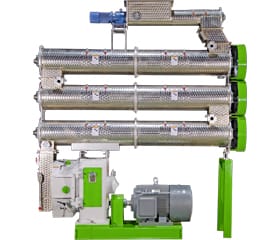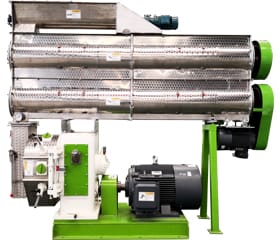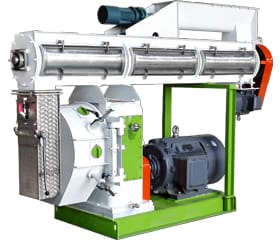Points that should be paid attention to when using additives in poultry chicken feed
Feed additives are small amounts of micronutritive or non-nutritive substances added to the feed to meet the special needs of animals. The development of modern intensive aquaculture industry makes feed additives play an increasingly important role in poultry feed processing. Reasonable use of feed additives can increase feed utilization, prevent diseases and promote healthy growth of poultry, improve product quality, enhance product competitiveness, and create better economic efficiency.
With the development of modern animal husbandry, feed additives are widely used in the poultry chicken breeding industry. Feed additives can improve the nutritional value and completeness of feed, increase feed utilization, and promote poultry growth; prevent diseases and improve poultry health; improve The physical properties of feed, improve the processing and storage characteristics of feed; improve the quality of livestock products, etc. However, there are some misunderstandings in the use of feed additives. Some farmers believe that the more varieties of feed additives added, the better.

In fact, poultry chicken feed additives must be reasonably added according to the poultry species and physiological period. The dosage and method of addition are very important. Misuse of feed additives not only fails to achieve the expected results, but also reduces production, residues and poisoning. With the improvement of living economy, modern people’s awareness of food safety is becoming stronger and stronger, and the quality requirements for animal products are getting higher and higher. Therefore, green, safe and pollution-free feed additives are added to feed. The products of scientific and green breeding are very popular.
1. Classification and main functions of feed additives
Feed additives are divided into: nutritional feed additives and general feed additives (including pharmaceutical additives).
Nutritional additives include feed-grade amino acids, vitamins, mineral trace elements, non-protein nitrogen, etc. Its main function is to provide the nutrients necessary for the healthy growth of poultry, improve the amino acid balance of the diet, increase the utilization of protein, and promote the growth of poultry; improve the quality of meat; promote calcium absorption; resist stress; improve disease resistance; improve and improve Animal digestion function prevents the occurrence of digestive diseases in the system.
General feed additives include feed drug additives (antibiotics and synthetic antibacterial), probiotics, enzyme preparations, acidifiers, Chinese herbal medicines and plant extracts, antifungal agents, feed modifiers, and flavoring agents. General feed additives are used to improve feed utilization, ensure feed quality and quality, attract food and flavor, and are beneficial to animal metabolism and health. Antibiotics in modern farming have been gradually replaced by pollution-free feed additives. Natural medicinal plant products, Chinese herbal feed additives, probiotics (probiotics and prebiotics), enzyme preparations, oligosaccharides, amino acids, vitamins, acid preparations, etc. It is a pollution-free feed additive with comprehensive functions and rich nutrition. It is fed with food without residues and does not produce drug-resistant strains and toxic side effects. Poultry products raised by these additives are sought after by people.
2. The effect of feed additives on the performance and physiological functions of poultry
Feed additives play an important role in the poultry feed production performance and physiological functions of poultry. The most commonly used additives in poultry farming are microecological preparations, enzyme preparations, oligosaccharides, biologically active peptides and Chinese herbal medicine feed additives.
Microecological preparations can improve the flora in chickens, reduce the incidence of salmonella and coccidiosis, and have a good effect on improving the disease resistance and immunity of the chickens; feeding the microecological preparations can make the serum and intestines in the chickens. Enzyme activity in the tract increases, which is conducive to the digestion and absorption of nutrients and reduces the feed-to-meat ratio; adding microecological agents in the drinking water of laying hens in summer can increase heat dissipation and relieve the heat stress response of the flock.
Chinese herbal medicine feed additives are widely used in the breeding of livestock products and have antibacterial effects, can improve the balance of the intestinal flora of poultry, and promote the absorption and utilization of feed; it can improve production performance, reduce production costs, enhance immunity, and promote growth. Improve the quality of poultry ketones, naturally pollution-free and enhance product competitiveness, especially in broiler breeding, Chinese herbal medicine compound preparations can reduce the rate of abdominal fat in the body, increase the rate of leg muscles and breast muscles of broilers; oligosaccharides can improve the intestinal tract The microbial flora promotes the growth of broilers; commonly used enzyme preparations such as protease, amylase, lipase, etc. can make up for digestion problems caused by insufficient digestive enzymes, improve feed conversion rate and economic benefits.
Other additives such as: Functional oils can increase the apparent metabolizable energy of broilers, significantly improve the fluff surface area of the intestines of poultry, enhance the absorption of nutrients in the intestines, and improve production performance; organic arsenic preparations have an effect on the growth of young birds. Promoting effect; adding 0.15%~0.19% sodium in the feed can increase the slaughter weight and breast muscle weight of broilers. Too high or too low concentration will have a negative impact on the performance of broilers; feeding with 0.25% sodium bisulfate Diets improve the performance of broilers and reduce the level of Salmonella in the environment.
3. The effect of feed additives on fat metabolism of poultry
Additives in chicken feed have a very important effect on fat metabolism. Excessive body fat in poultry not only causes waste of feed but also affects carcass quality, while laying hens can cause fatty liver and affect egg production. Some additives in the feed have an impact on the fat metabolism of poultry: Daidzein can promote the fat metabolism of animals and improve the body's immunity, and L-carnitine can inhibit the synthesis of fat and promote the decomposition of fat, thereby improving the quality of meat. Betaine, niacin, and chitosan have the effects of reducing body fat synthesis, increasing fat decomposition or redistributing body fat.
4. Pay attention to the problems of chicken feed additives
The rational use of feed additives has a positive impact on the poultry industry. While providing the body with essential nutrients, it is anti-stress, protects the body's immune organs, and improves immunity; enhances material metabolism and feed conversion rate, and increases economic benefits for farmers. There are several problems in the use of feed additives: (1) The dosage is insufficient or too high. Excessive use will also affect the health of livestock and poultry. For example, trace elements: iron, copper, and zinc can promote growth when used normally, but Excessive addition affects the normal metabolism of poultry.
(2) The abuse of antibiotics will cause drug residues and destroy the ecological balance of microorganisms in the body.
(3) The use of hormones can promote growth, and a large amount of use will remain in animal food. People who use this kind of food for a long time affect the body's hormone levels, and there are risks of precocious puberty, carcinogenesis, teratogenesis, and mutation. Many countries have now banned the addition of antibiotics to feed. We call on the majority of farmers to use green, safe, and pollution-free feed additives in the breeding process.
[More info about chicken feed]
(1)complete chicken feed pellet production line with CE(How to make chicken feed pellet)
(2)poultry feed pellet mill plant manufacturer
(3)best price corn grinder for chicken
(4)poultry chicken broiler animal feed pellet making plant with reasonable price
If you want to built one complete pellet production line in your country, pls send the inquiry to us. We will customized design according to your requirement.



